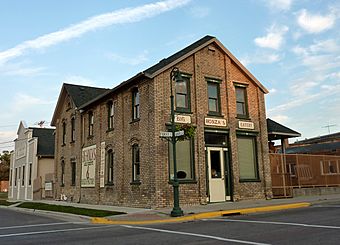Westerman Lumber Office and House facts for kids
Quick facts for kids |
|
|
Westerman Lumber Office and House
|
|
 |
|
| Location | 201 S. 1st St., Montgomery, Minnesota |
|---|---|
| Area | less than one acre |
| Built | 1880s |
| MPS | Le Sueur County MRA |
| NRHP reference No. | 82004702 |
| Added to NRHP | March 15, 1982 |
The Westerman Lumber Office and House is a really old and important building in Montgomery, Minnesota. It's special because it was added to the National Register of Historic Places on March 15, 1982. This means it's a building worth protecting because of its history. It's also a great example of brick buildings from the late 1800s in this area, made with bricks from the nearby Minnesota River Valley.
Contents
Building Design and Features
The Westerman Lumber Office and House stands in the main business area of Montgomery. It has a unique "L" shape. The roof is shaped like a gable, which means it slopes down on two sides, like a triangle. This roof folds over the front of the building.
The building started as a small office made of wood in the 1880s. Later, in 1895, a back part was added. The whole building was then covered with a light brown brick. You can see brick strips, called pilasters, at the corners and between the window sections on the front.
The front of the building has rectangular windows with green wooden frames. Above these windows, the wooden lintels (the support beams) have cool flower designs. The windows on the second floor can slide up and down. On the north side of the building, the windows have arched brick tops and decorative brick panels below them.
History of the Westerman House
The story of the Westerman Lumber Office and House begins with Henry E. Westerman. He moved to Le Sueur County in 1873. When the town of Montgomery was founded in 1877, he moved there to start a sawmill.
From Office to Family Home
Henry Westerman started his company, the Westerman Lumber Company, in 1889. He bought this building in 1891 to use as his office. In 1895, he made the building bigger by adding a section to the back. This allowed his family to live there. At that time, he also had the entire building covered with the buff-colored brick you see today.
Changes Over Time
Eventually, Westerman's company grew too big for the building. He sold it in 1915. When it was sold, the original front door was bricked up. By 1996, the building was being used as a private home.
Later, a person named John A. Grimm, who used to be an airline pilot, restored the building. He also helped restore another important building in Montgomery called Hilltop Hall. Today, the Westerman Lumber Office and House is home to a Pizzeria!
 | Madam C. J. Walker |
 | Janet Emerson Bashen |
 | Annie Turnbo Malone |
 | Maggie L. Walker |



